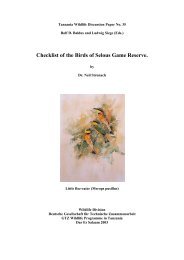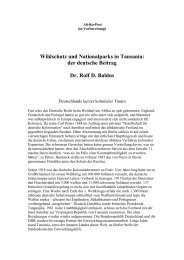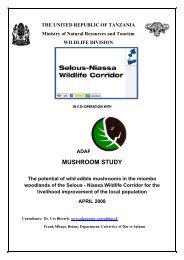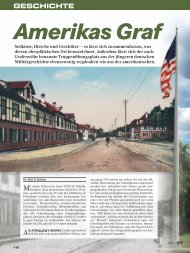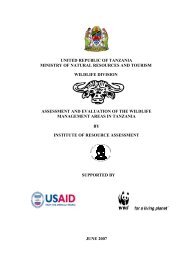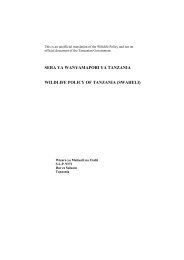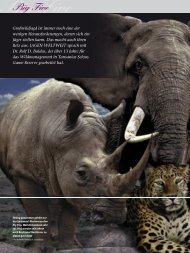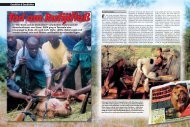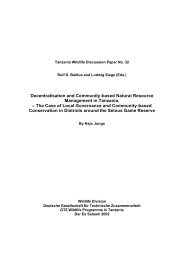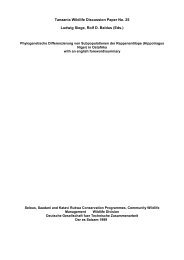African Indaba Articles - wildlife-baldus.com
African Indaba Articles - wildlife-baldus.com
African Indaba Articles - wildlife-baldus.com
Create successful ePaper yourself
Turn your PDF publications into a flip-book with our unique Google optimized e-Paper software.
and adequate training programs with considerably more depth than those existing. There are no 10-dayshortcuts to enter the hunting profession. PHASA, SETA and a panel of experts must work out an exactingcurriculum, drawing for example from the successful history of PH training in Zimbabwe. Collaboration ofindustry and government partners will result in the development of business tools, kits, manuals andcertification systems. Conferences, workshops, seminars, etc. will reinforce, deepen and expand theknowledge base. Potential partners would be WWF-SA, the Southern <strong>African</strong> Wildlife College andinternational hunting advocacies or organizations like Conservation Force 21 and the International Council forGame & Wildlife Conservation (CIC) 22 . PHASA and the international hunting <strong>com</strong>munity could show their<strong>com</strong>mitment by supporting and partially funding such training. A nationwide search and selection process fora pool of promising BEE candidates and their rigorous training covering all aspects from economics, hunting,client relations and social skills is fundamental for success of these efforts.Some years ago, PHASA initiated the “PHASA Conservation Fund”. This initiative is based on levying a$10 surcharge on all trophies obtained by visiting hunters. Unfortunately PHASA has no means to oblige itsmembers to subscribe to this initiative. Therefore only a minority of far-sighted and socially concernedmembers contributed to the fund. Nevertheless, the PHASA Conservation Fund was able to donate 100,000Rand to the Southern <strong>African</strong> Wildlife College in 2004. If the Government would enable PHASA throughappropriate legislation and make membership for all professional hunters and outfitters <strong>com</strong>pulsory, thePHASA Conservation Fund could raise around 500,000 to 600,000 dollars annually (between 3.5 and 4million Rand). This money could be used for social extension and <strong>com</strong>munity conservation projects. TheSouth <strong>African</strong> amateur hunting associations could also consider initiating similar funds.Some options, especially a) and b) are already explored by a few, albeit not by as many as we wouldwish. Other new suggestions, in particular in connection with c) will raise a storm of controversy.Nevertheless we need to explore them and government has the obligation to facilitate a reasoned dialogue to<strong>com</strong>e to negotiated solutions.In the following section, I will touch the nerve of many. However, I consider that the Government’spriorities, like BEE, poverty relief, sustainable development and last not least, biodiversity conservation, forceour society to explore new alternatives to further reasonable progress in all objectives.4.4. Hunting in Protected AreasIn South Africa, hunting is <strong>com</strong>mon practice within the boundaries of numerous Provincial nature andgame reserves (Mpumalanga, North-West, KwaZulu-Natal, Free State, Eastern Cape, and Limpopo). The50,000ha Pilanesberg National Park derives a large proportion of its budget from controlled hunting inaddition to receiving at least 400,000 game-viewing tourists annually. Trophy hunting has been undertaken inPilanesberg since its establishment in 1979 and is still done today as part of the recognized managementplan (Boonzaaier & Collinson, 2000). Several of these protected areas have higher intrinsic conservationvalues than some national parks, nevertheless, the practice of hunting is accepted within these conservationareas. It is guided by scientific advisory staff and a board that represents broad societal interests (Stalmans,Atwell, Estes et al, 2003).In protected areas managed by SANParks hunting is prohibited. I suggest that a careful review of thispolicy is overdue, with the objective of making parts of the SANParks protected areas available for closelymonitored conservation hunting. Such a step will instantly create many BEE opportunities as private-public orprivate-<strong>com</strong>munity-public partnerships (Community Property Associations CPA) or a <strong>com</strong>bination. Openingnew avenues with full transparency and public accountability, viable and meaningful BEE could be developedfrom scratch, thus avoiding social tensions. Namibia is exploring this avenue with good success. At the sametime new and considerable revenue streams will be unlocked for conservation purposes, alleviating theburden of the management of protected areas on the national and provincial budgets without <strong>com</strong>promisingeither the tourism value or conservation objectives.21 Conservation Force – A Force for Wildlife Conservation, One Lakeway Center, 3900 N Causeway Blvd., Suite 1045, Metairie, Louisiana 79992-1746, USA, email:jjw-no@att.net, web: www.conservationforce.org22 International Council for Game and Wildlife Conservation (CIC), P.O. Box 82 H-2092 Budakeszi, Hungary phone: +36 23 453 830 email: k.wollscheid@cic<strong>wildlife</strong>.orgweb: http://www.cic-<strong>wildlife</strong>.org15



